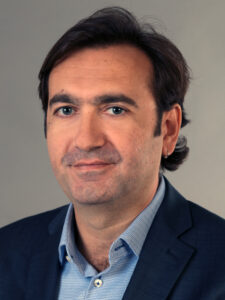Winter Semester 2020/21
Dr. Giovanni Tidona
Giovanni Tidona (Scicli, 1982) studied literary science and philosophy in Milan and Bologna. After the completion of his studies, he obtained his doctorate in practical philosophy at the Johannes Gutenberg-University in Mainz in 2013. This was followed by numerous teaching and research experiences in philosophy and its interdisciplinary forms of application at the Eugen-Fink Research Center, at the Philosophical Seminar of the Johannes Gutenberg-University in Mainz, at the University of Kaiserslautern and at the SRH University in Heidelberg. From 2016 to 2018 he represented the professorship for philosophy/ethics and its didactics at the University of Education in Heidelberg. All the while, Tidona gained relevant linguistic and educational work experience in the areas of migration and integration. Since April 2020, he has been working as a scientific assistant for philosophy at the Institute for Philosophy at the University of Koblenz-Landau, Campus Koblenz.
His teaching and research activities focus on social ontology - especially xenology - phenomenology, spatial theory, the history of philosophy and natural philosophy. His research is centered on the interdisciplinary applications of philosophy in the context of ethics, aesthetics, education, didactics, anthropology and cultural studies.
Tidona's current research is based on the topic nature/world in terms of phenomenology, cultural-philosophical community paradigms and the social-ontological nexus foreign/different. His methodology is based on an interdisciplinary development of textual fundi and relevant linguistic thought networks. His work is permeated by the basic understanding of philosophy as an intercultural technique.
In the winter semester 2020/2021, Dr. Giovanni Tidona is a Senior Fellow at the Center for Intercultural Studies (ZIS), primarily with the new edition project of the classic xenology by Munasu Duala M'bedy: Xenologie. Die Wissenschaft vom Fremden und die Verdrängung der Humanität in der Anthropologie, Alber, 2021, to which he has written an extensive introduction. As part of the fellowship, he is going to hold a public online lecture on xenology in November 2020. Additionally, he is organising an interdisciplinary teaching seminar on the foreign in ethnology and philosophy („Das Fremde in der Ethnologie und Philosophie“ [WiSe 2020-21]) in cooperation with Prof. Matthias Krings and will offer a workshop at the SoCuM-AG „Translation und Fremdheit“ in Germersheim on the subject of linguistic philosophy contours of xenology („Sprachphilosophische Konturen der Xenologie“).
Publications
Monographs:
Gemeinschaften. Figuren der Lebensteiligkeit, Freiburg: Alber, 2019, 344 pages (reviewed in Zeitschrift für Kulturphilosophie 2020/1 and Polylog 42).
Ding und Begegnung. Sprach- und Dingauffassung im existenzialen und dialogischen Denken, Freiburg: Alber, 2014, 304 pages (reviewed in Phänomenologische Forschungen 2016).
Editorial work:
Munasu Duala M´bedy: Die Wissenschaft vom Fremden und die Verdrängung der Humanität in der Anthropologie, to be published by Alber Verlag in 2021.
Xenologische Ansätze und ihre Relevanz für die Bildungsfrage, Heidelberg: Mattes Verlag, 2018 (Diskurs Bildung. Schriftenreihe der Pädagogischen Hochschule Heidelberg 61).
Martin Heidegger e Karl Löwith, Carteggio 1919-1973, Pisa: ETS-Edizioni, 2018 (Italian publication of the letter exchange 1919-1973, Freiburg: Alber, 2018; [reviewed by Donatella di Cesare in La lettura, Corriere della sera, 11.03.2018; reviewed by Francesco Terenzio in Itinerari 2019; reviewed by Stefano Petrucciani in Il manifesto, 06.06.2018]).
Karl Löwith: Das Individuum in der Rolle des Mitmenschen. Ein Beitrag zur anthropologischen Grundlegung der ethischen Probleme, Freiburg: Alber, 2013, 2 Versehen mit der Einleitung: „Über die Grenzen der Phänomenologie und unterwegs zur Dialogik: Das Individuum in der Rolle des Mitmenschen“, 11–79.
Essays:
„Lo scudo di Agamennone. La paura come oblio della realtà“, in: Filosofia e teologia (XXXIII 2019/2), Edizioni Scientifiche Italiane, 2019, 292–306.
„Die «verkehrte Welt». Er-Örterung raumtheoretischer Dimensionen der Flucht“, in: Studia Phaenomenologica, Volume 18, zetabooks, 2018, 329–343.
„Bildungskrise als Krise des Poietischen. Philosophisch-pädagogische Problemverflechtungen am Beispiel des Begriffs der Kompetenz“, in: Bildungsreformen und Bildungskrisen. Zur Organisation des Wissens in der Wissensgesellschaft, ed. Georg Zenkert, Heidelberg: Mattes Verlag, 2017 (Diskurs Bildung. Schriftenreihe der Pädagogischen Hochschule Heidelberg 62), 77–106.
„Gioco e Unbekümmertheit. Una logica semantica di costituzione dell’oggetto «disinvolta»“, in: Trό Rivista di ermeneutica e critica filosofica (ed. Gianni Vattimo und Gaetano Chiurazzi), X, 1, Turin: Aracne, 2017, 199–220.
„Dalla Lichtung alla Umgebung: L’umanismo cosmologico di Karl Löwith“, in: La questione dell’umanismo – oggi, ed. Virgilio Cesarone, Macerata: Quodlibet, 2017, 55–71.
„Die Frage der humanitas bei Karl Löwith und Martin Heidegger. Eine Ortsmetapher“, in: Perspektiven der Philosophie. Neues Jahrbuch 40, Amsterdam / New York: Rodopi, 2014, 277–308.
„I prodromi del postmoderno: la crisi della rappresentazione della realtà in letteratura“, in: Magister. Le nuove frontiere dell’educazione, Rosolini: Grafiche Santocono, 2010, anno I, N. 0, 133–142.

